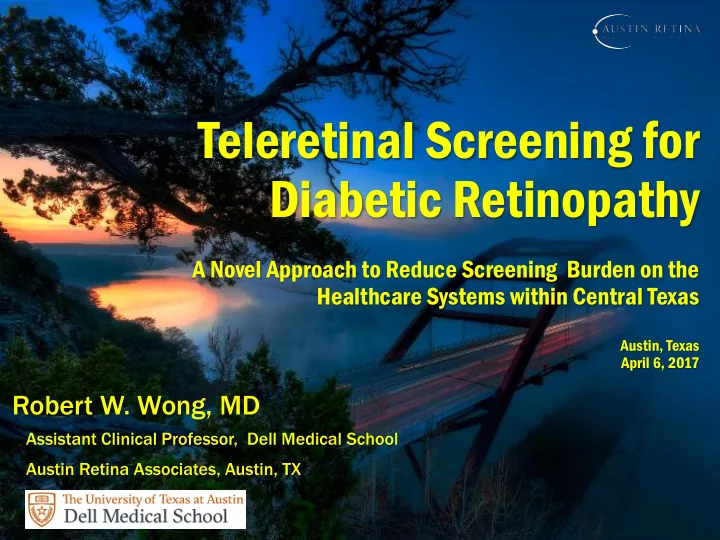

Teleretinal Screening for Diabetic Retinopathy A Novel Approach to Reduce Screening Burden on the Healthcare Systems within Central Texas Austin, Texas April 6, 2017 Robert W. Wong, MD Assistant Clinical Professor, Dell Medical School Austin Retina Associates, Austin, TX
3835
200 Amputations
136 Develop Kidney Disease
1795 Severe Diabetic Retinopathy
Diabetes
Leading Cause of Blindness in younger patients in the US
ADA Guidelines Type 1: Annual screenings within 5 years of onset Type 2: Annual screenings immediately following diagnosis Then, yearly follow up exams.
PAINPOINT Patients don’t get screened In Travis County 25% made appointments After vigorous calling, still only 50% made appointments
Stakeholder: Patient Burden to the patient Travel Time off work Cost
Stakeholder: Doctors Burden to the Doctor Primary Care Doctor Needs Unused appointment slot in Specialists office
Stakeholder: Healthcare System Cost Burden to the Healthcare System
Elements of Disruptive Innovation Clayton Christensen. The Innovator’s Prescription. 2009.
Solution: Teleretinal Screening
How Diabetic Teleretinal Screening Works
Our Study Austin Regional Clinic CommUnity Care / Central Health 5 Locations 2 locations 3620 diabetics screened 1830 diabetics screened 12 month period 6 month period 99% had insurance Uninsured or underinsured Private practice patients Safety net population 1. Prevalence and Severity of Diabetic Retinopathy 2. Prevalence of Diabetic Macular Edema 3. Capture Rate: % of patients with pathology that attended appointment with retinal specialist
Overall Prevalence in Travis County 5450 patients screened Total Prevalence of Retinopathy 22.7% Total Prevalence of Macular Edema 6.3% Patients requiring Urgent Referral 11.8% Capture Rate 65.0%
Reduced Burden 1558 CommUnity Care patients (85.1%) did not require further evaluation by a retinal specialist 3249 ARC patients (89.9%) did not require further evaluation by a retinal specialist
Those that needed to come in… we got in Capture Rate at CC was 65.4% Capture Rate at ARC was 65.5% Previous reports in literature ~30%
Differences? Retinopathy and Macular Edema were higher in CommUnity Care patients than Austin Regional Clinic DR: 26.6% versus 20.7% p < 0.0002 DME: 8.6% vs 5.1% p < 0.0002
Does Geography make a difference? CommUnity Care Southeast Location had worse retinopathy than North-Central DR: 28.9% versus 24.0% DME: 10.1% versus 6.9%
Hwy 183 Corridor Ben White Blvd Corridor
Future Directions Better understand demographic data and biomarkers to account for differences Collaborate with Seton Medical Center Collaborate with Intelligent Retinal Imaging Systems to create a nationwide map of diabetic retinopathy
Make information available to Stakeholders Patients Government Physicians Industry Epidemiologists Tech
Special Thanks Maria Benson, BS Anas Dhagastani, MD Jose A. Martinez, MD Austin Regional Clinic C. Armitage Harper, MD Mark S. Hernandez, MD James W. Dooner, MD Jonathan Morgan Mark Levitan, MD Central Health / CommUnity Care Peter A. Nixon, MD Jason Crawford Shelley Day-Ghafoori, MD Stephanie Collins, MBA Intelligent Retinal Imaging Systems rwong@austinretina.com @drwongsays Blog: www.36thandhamilton.com
Recommend
More recommend